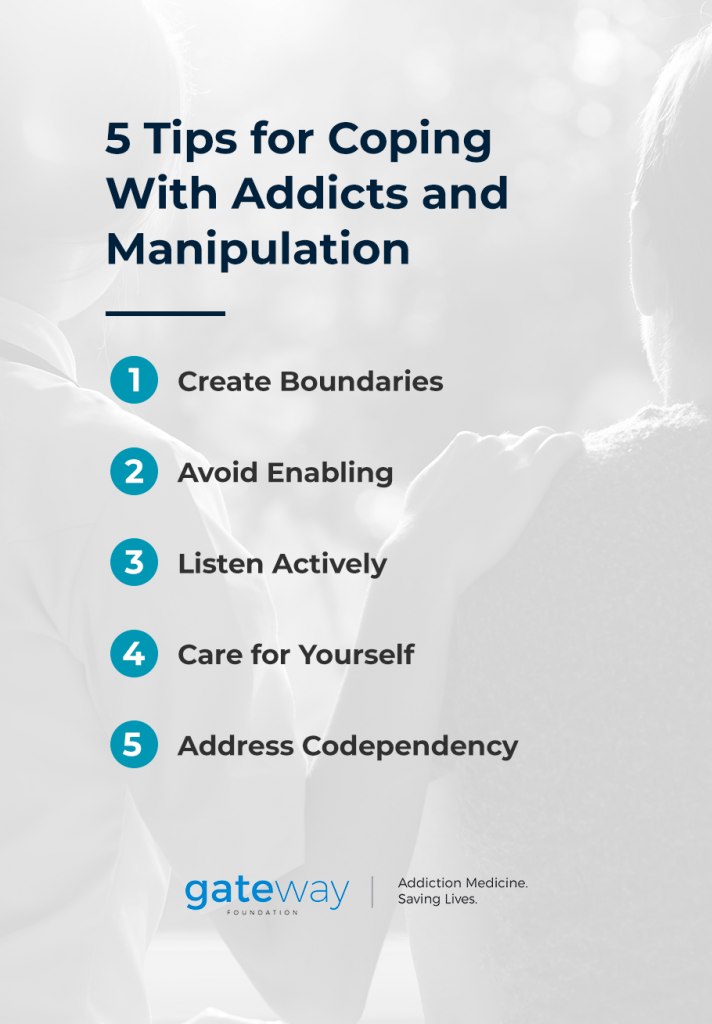- May 18
- Drug Addiction Treatment
When you care about someone with an addiction, you may find some of their behaviors confusing and upsetting. Two common threads you can observe in nearly all addictions are lying and manipulation on the part of the person abusing drugs or alcohol.
So, why do people with addiction lie and cheat? How do you recognize when you are being manipulated, and what can you do about it? The answers to these critical questions will impact the way you handle typical addiction behavior in your relationships, and the role you play in convincing someone with an addiction to seek treatment.
Why Are Many People With Addiction Manipulative?
The most important thing to remember when someone you know is addicted is that addiction causes changes in the brain itself. It’s common to hear that addiction has “hijacked” the brain, and it results in people acting in ways they might never have considered prior to their struggles with drugs or alcohol.
Addiction begins when the brain begins to adapt to the frequent consumption of a substance. Normally, the brain rewards healthy behaviors like bonding with friends and family, exercising or eating a good meal. Likewise, the brain’s reasoning ability allows us to properly weigh consequences and decide which actions we shouldn’t take. However, drugs and alcohol provide an immediate, artificial sense of gratification to the reward system that far outweighs the pleasure received from everyday activities. This results in the addicted person wanting more and more of the substance, regardless of the consequences.

- Need for control: The loss of control associated with addiction can cause a person to try and compensate by controlling the people around them.
- Desperation: Drug and alcohol cravings quickly erode a person’s morals and principles, causing people to stop caring about how their actions are affecting relationships.
- Guilt and shame: Some people realize their addiction is affecting their loved ones, and they experience partial remorse that causes them to try and lie about substance abuse.
- Difficulties with Objective Thought: Addiction and substance abuse negatively impacts a person’s ability to think clearly and make educated and informed decisions. They often don’t think beyond their next fix and whatever they have to do to achieve it.
- Cravings: We define addiction as an uncontrollable need, both physical and psychological, for drugs or alcohol. People suffering from addiction use these cravings to justify their manipulative behaviors.
 Common Manipulation Tactics Associated With Addiction
Common Manipulation Tactics Associated With Addiction
Why do people struggling with addiction lie and manipulate in certain ways? If you have been exposed to more than one case of addiction in your life, you may have realized that manipulative behavior tends to look similar even in very different people. Addiction behavior patterns can be more easily spotted if you become familiar with these five common examples of manipulation common to those with alcohol addiction:
1. Asking for Money
No matter the substance, addiction is expensive. A person struggling with addiction will keep spending more and more to obtain drugs or alcohol at the expense of their other financial obligations. Asking for money or other favors is a hallmark of manipulation, and they don’t generally state that the money is going to their addiction. Instead, they may say they are facing an unexpected bill, or just need a little help with rent. This is a tactic to try and stop you from asking further questions.
2. Causing Fights
Causing fights on purpose is typical addiction behavior in relationships. The person may start a fight to distract from a pressing discussion about their addiction. If you are busy fending off emotional attacks, you aren’t able to address the root problem of substance abuse, and it may also be some time before you feel confident enough to bring up the subject again.
3. Isolating and Self-Harm
When they don’t get what they want, they may attempt to punish you by hurting themselves. They may withdraw contact, isolating themselves and leaving you to wonder how they are doing. They may even actively self-harm through actions like purposely going on a bender, drinking and driving or refusing to eat. In extreme cases, self-harm may manifest in actions like cutting.
4. Guilt-Tripping
Someone with an addiction will almost always blame everyone but themselves for their situation. You will have to contend with statements that imply or state outright that you are at least partially responsible for the person’s addiction and their manipulative behavior. Whether the implication is subtle or the person flat out says it, the sentiment you will hear is “look what you made me do.”
5. Being Overly “Nice”
The cycle of addictive behavior patterns usually contains a period where the addicted individual gives the appearance of changing for the better. They may suddenly seem contrite, sorry and genuinely remorseful — when in reality, this is just another tactic to keep you emotionally vulnerable and off-guard.
6. Shifting the Blame
Another example of drug addiction manipulation is a tendency to continually shift the blame away from themselves. They seemingly never take responsibility for their actions, and will always find ways to blame anyone or anything other than themselves. In their mind, their addiction isn’t their fault. Instead, it becomes the fault of family members who didn’t love them or a stressful job or the phase of the moon — anything to keep them from having to take responsibility themselves.
How to Recognize Manipulation in Your Life
Recognizing manipulative behavior is not always easy to do, especially when you’re coming from a place of love and concern. No one wants to believe someone they care about is manipulating them, but recognizing the signs is critical if you want to maintain a relationship and set healthy boundaries. If you suspect the person is attempting to manipulate you, look for these signs in the interactions:
- The person is given to frequent exaggerations and black-and-white language like “always” or “never” when describing themselves and others.
- The person knowingly pushes your buttons by preying on your emotional, physical or monetary fears.
- The person frequently alludes to their importance in your life or tries to assert their power over you in the relationship.
- The person steamrolls you during conversations, not giving you enough time to think and respond.
- The person is only kind and attentive when they want something from you.
- The interaction is leaving you feeling used, confused, bullied or guilty. They’ll remind you of your own failures and focus on those instead of being introspective.
- The person may bounce from family member to family member asking for favors, especially if they’re told no.
- The person might do nice things for you — give you a ride, buy you lunch, etc, — to try and prove that they’ve changed.
- The person will never take responsibility for their behaviors, instead choosing to blame their lifestyle, other people, or anything other than themselves.
If you see any of these telltale signs of manipulation during a conversation, it’s time to take a step back and employ some coping strategies to protect yourself.
5 Tips for Coping With Addiction and Manipulation
Learning how to handle manipulation from people suffering from addiction is never easy. You will feel confused, hurt and sometimes betrayed. However, there are steps you can take to maintain your emotional health while supporting your loved one with addiction:
1. Create Boundaries
The toughest and most important part of shutting down manipulation and typical addiction behavior in relationships is to set clear boundaries. You have to determine what behaviors you will and will not accept and present consequences for when the person violates those boundaries. For example, if your loved one tends to shout when they get upset, you can let them know that the next time they raise their voice, you will stop the conversation and leave the room until they are back under control.
2. Avoid Enabling
Manipulation includes blurring the lines between real support and enablement. They may be able to convince you that giving them money to “cover the heating bill” is a truly helpful and appropriate action, when in reality, it is a classic form of enabling. Become familiar with common forms of enabling and identify how you may be contributing to the person’s ongoing addiction. Don’t just say “yes” to their every request without thorough examination.
3. Listen Actively
People with addiction are often masters at controlling conversations, leaving you little room to respond thoughtfully. If you can practice active listening and get to the root of what the person is truly saying, you may be able to call out manipulative behavior when you hear it. Don’t respond to a series of rapid-fire questions immediately; take the time to listen and understand before responding. This can halt manipulative behavior while also reminding the person that you truly are invested in their well-being.
4. Care for Yourself
There will be times when the only healthy option you have is to retreat and take time for yourself. It’s hard to say “no” to someone with an addiction, but if you are burned out from frequent manipulation, you won’t be able to support the person effectively. Consider seeing a therapist of your own or finding an emotional outlet to make sure you keep your own mental health a high priority.
5. Address Codependency
Lies and manipulation can quickly create codependency in a relationship. Due to the constant demand for enabling behavior, you may end up in the role of “fixer” and find it extremely difficult to break out of that pattern. Codependency is best addressed in therapy, but learning how to identify and avoid it can help you steer clear of manipulation.
6. Say No
Sometimes, something as simple as saying no can help you avoid drug and alcohol addiction mind games. Don’t be angry or raise your voice. Just calmly say no, and end it at that. The goal here isn’t to pick a fight or confront the manipulative individual. The goal is to just say no. It’s as simple and as complicated as that.
7. No Lesser Evils
One common way people with addiction manipulate their friends and families is to try to force you to choose the ‘lesser evil’ in a situation. They may say that it’s better for them to be getting high at home instead of carrying out their dangerous behavior out on the streets or other similar arguments. Don’t allow any lesser evils. This goes back to the issue of enabling and codependence, but it is so common that it required its own tip.
8. Request Receipts
One of the cornerstones of manipulation is the empty promise. The person will tell you that they’ve got a new job lined up or that they’re getting ready to start school even though the semester began months ago. It’s a manipulation tactic designs to pout your mind at ease to take the focus away from their addiction. Don’t accept promises. Request receipts. If they’ve got a job lined up, request that they show you the job offer. If they’re starting school, request a proof. We specify request here — don’t issue demands or turn it into a fight. Simply ask for proof before accepting any promises at face value.
How to Help a Manipulative Person with Addiction Seek Treatment
It’s critical to remember that someone with an addiction lies to themselves, as well as to others. Their manipulation may be invisible to them because they are being manipulated by their own brain. Addiction tells people they don’t need to seek treatment for a variety of reasons, and it can be extremely challenging to make them see the truth. You may not be able to single-handedly convince your addicted loved one to enter a treatment program, but you can help guide them there with these four tips:
1. Learn About Addiction
When talking to someone with an addiction, you need to know what you’re talking about. If you show that you don’t know much about the particular substance the person is struggling with, they may use your lack of knowledge as another weakness that can be manipulated.
If you’re not familiar with alcoholic beverages, for example, you may not know what a standard drink looks like. The person may use this information to make a very strong, intoxicating drink while insisting to you they’ve “only had one!” If you can identify signs and symptoms of usage, you can keep the person from trying to pull the wool over your eyes and can point out that they really do need treatment.
 2. Face the Facts
2. Face the Facts
Those with addiction distort facts to make their addiction look less severe. If you point out that they were high a lot in the past three months, they may brush it off by saying it was only a few times. If you are able to keep track of adverse events that occurred because of the person’s substance abuse, you can identify and reject fact-bending and force them to confront their actions.
Many people with addiction need to be shown the true extent of their condition before they accept treatment, and a list of objective facts can make them see their need for treatment.
3. Ignore Their Exceptionalism
Every person with addiction feels that in some way, the normal course of addiction does not apply to them. This sense of exceptionalism is the only way people can convince themselves their addiction is not enough of a problem to treat. Some examples of lies and manipulation tied to exceptionalism include:
- “I’ll get treatment eventually.”
- “I don’t need treatment because I’m still healthy.”
- “I can stop on my own when I decide to.”
- “I don’t need to stop because I still have my life together.”
By learning about the causes and effects of drug and alcohol addiction, you will quickly learn that the patterns of addiction do apply to everyone, and you can help your loved one see it too. However, you may have to experiment with multiple approaches of “tough love” confrontation to more gentle techniques like active listening. Regardless of your approach, remaining calm and reiterating your concern and support for the individual is essential if you want to break through to them.
4. Show Them Options
Getting someone with an addiction to talk about treatment options is not easy. However, once you manage to break through the lies and manipulation, it may become possible to have a frank discussion. That discussion will be most productive if you have something to bring to the table. Rather than just asking if they have thought about treatment, it’s best to be specific and share the information you have gathered about types of treatment and places they can go to get it.
This may give them resources they didn’t have before, and show them you care enough to do the research in the first place. This compassion on your part may be part of the push a manipulative person with addiction needs to enroll in a treatment program.
 Healing Starts With Addiction Medicine
Healing Starts With Addiction Medicine
If someone in your life is wrestling with addiction to drugs or alcohol, helping them find effective treatment can be a worrying challenge. Gateway Foundation is here to help, with evidence-based addiction medicine and personalized treatment programs that have helped over a million people overcome their problems with substance abuse. We provide multiple levels of care, from residential treatment to outpatient treatment.
To find out more about our programs and services to help the addicted person in your life, give Gateway Foundation a call at 877.505.4673. You can also reach us through our online contact form with your questions about addiction and recovery.

 Common Manipulation Tactics Associated With Addiction
Common Manipulation Tactics Associated With Addiction
 2. Face the Facts
2. Face the Facts Healing Starts With Addiction Medicine
Healing Starts With Addiction Medicine
